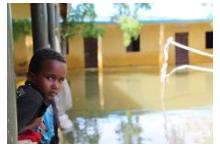Protecting Children Against El Niño's Harsh Effects
của SAVE THE CHILDREN FEDERATION INCTHE TIME FOR ACTION IS NOW
Humanitarian crises continue to unfold daily. We know we
can reduce their impact and save lives by acting early. Save
the Children works with communities to develop detailed
plans to do just that. With an anticipatory action plan that
spans four global regions most at risk, we are initiating
efforts in more than 15 countries focusing on preventing
hunger through drought-resistant crops, cash assistance
for predicted floods, and scaling up emergency infant and
child feeding, alongside pre-positioning nutrition supplies.
WHY EL NIÑO MATTERS
El Niño causes pronounced shifts in Pacific Ocean sea
surface temperatures, rainfall, and atmospheric patterns,
driving extreme weather including drought, floods, hot
and cold waves and severe storms that amplify significant
risks to children globally. The predicted intensity of this El
Niño mirrors those of 1997 and 2015, both of which led to
humanitarian crises on several continents.
HOW EL NIÑO AFFECTS CHILDREN
DISEASE AND HUNGER
Researchers note that El Niño can leave about 6 million
kids malnourished, making them more likely to get sick,
and affecting their growth. Additionally, increased flooding
increase waterborne diseases like cholera, and the spread
of mosquito-borne illnesses such as dengue and malaria.
POVERTY AND DISPLACEMENT
Forced displacement, separation from family, and loss of
homes during drought and floods increase risks of poverty,
emotional distress and exploitation.
DISRUPTION OF EDUCATION
Schools not only provide children with a space to learn.
Children out of school lose access to school meals,
affecting nutrition and food security and face increased
risk of child marriage and labor exploitation. Being out of
school for even a short amount of time has lifelong impacts
on a child's development.
OUR RESPONSE
To combat these challenges, we're bolstering efforts to curtail the effects of El Niño disasters on communities through anticipatory action, a strategy of acting ahead of a predicted hazard to prevent or reduce the impacts on communities before they fully unfold. This proactive approach operates in the pivotal period between an early warning's issuance and the onset of a crisis. By using pre-planned resources, anticipatory action aims to act before a hazard fully manifests,minimizing its impact.
The approach not only saves lives and lessens suffering but also reduces the cost of responses and upholds community dignity. According to UN Office for Disaster Risk Reduction, every $1 invested in anticipatory action can save up to $7 in disaster response and recovery costs.
CORE ACTIVITIES INCLUDE:
• Multi-purpose cash assistance ahead of flood or drought impacts
• Water and sanitation activities to reduce the risk to waterborne disease
• Communications and community engagement activities in preparation for the impacts of El Niño
• Work with governments to support the development of life-saving early warning systems
• Education interventions to prepare schools and learners and ensure continuity of learning before,
during and after impact
HELP BUILD RESILIENCE FOR A SAFER TOMORROW
The Children's Emergency Fund enables both anticipatory action before crises caused by El Niño and offers humanitarian support once emergencies hit. It helps communities and local partners to build their resilience and capacity, take early action when triggers are met, and invest in basic services on which children rely.
